#Hermann Karl Hesse
Text
Tal vez ahorcarse sea difícil, no lo sé. Pero vivir es mucho, muchísimo más difícil. ¡Dios sabe lo difícil que es!
"El lobo estepario", de Hermann Karl Hesse, escritor, poeta, novelista y pintor alemán, nacionalizado suizo

#Hermann Hesse#Hermann Karl Hesse#El lobo estepario#Escritores#Poetas#Novelistas#Pintores#Artistas#German people#Swiss people#Ahorcarse#Morir#Muerte#Suicidio#Vida#Vivir#Dios#Difícil#Frases#Libros
24 notes
·
View notes
Text
Whatever it is inside you shaping your life knows already. It’s so good to know that there’s something inside us, and that it knows everything, wants everything, and does everything better than we do!
Demain - Hermann Hesse
1 note
·
View note
Text
Rudolf Hess

This is Rudolf Hess, Hitler's ''dolphin'' timeline:
1894: He was born in Alexandria, Egypt.
1908: He returned to Germany with his family.
1914: WWI started.
1914: He enlisted in the 7th Bavarian Field Artillery Regiment, becoming an infantryman.
1914: On 9 November he was transferred to the 1st Infantry Regiment, stationed near Arras. He was awarded the Iron Cross 2nd class and promoted to Gefreiter (corporal)
1915: He was promoted to Vizefeldwebel (senior non-commissioned officer) and received the Bavarian Military Merit Cross.
1916: He was hit by shrapnel in the left hand and arm on 12 June 1916 in fighting near the village of Thiaumont. After a month off to recover, he was sent back to the Verdun area, where he remained until December.
1917: He was wounded on 23 July and again on 8 August.
1917: In October he received promotion to Leutnant der Reserve.
1917: He had been assigned to Jagdstaffel 35b, a Bavarian fighter squadron equipped with Fokker D.VII biplanes.
1918: He was discharged from the armed forces in December 1918.
1918: He joined the Thule Society.
1918: He joined a Freikorps group.
1919: He enrolled in the University of Munich, where he studied history and economics. His geopolitics professor was Karl Haushofer.
1920: He met his future wife, Ilse.
1920: He joined the Nazi Party.
1921: On 4 November he was injured while protecting Hitler when a bomb planted by a Marxist group exploded.
1922: He joined the SA.
1923: He took part in the failed Munich Putsch.
1923: He was arrested and sentenced to 18 months.
1923: He helped Hitler write Mein Kampf.
1924: He was released.
1925: Hitler named Hess his private secretary in April.
1928: He married Ilse Prohl.
1929: Hitler appointed him personal adjutant on 20 July.
1930: Hess became the owner of a BFW M.23b monoplane sponsored by the party newspaper.
1932: Hess was named party Political Central Commissioner.
1933: Adolf Hitler became Reich Chancellor.
1933: He was named Deputy Führer of the NSDAP on 21 April and was appointed to the cabinet, with the post of Reich Minister without Portfolio, on 1 December.
1934: Hess was given the rank of Obergruppenführer in the SS, the second-highest SS rank.
1935: Hess' office was partly responsible for drafting Hitler's Nuremberg Laws.
1938: His only child, Wolf, was born.
1939: The Second World War began.
1939: Hitler made Hess second in line to succeed him, after Hermann Göring.
1941: He flew to Scotland.
1945: The Second World War ended.
1946: At the Nuremberg Trials Hess, charged on four counts, was found guilty.
1946: He was sented to life in prison.
1987: He died.
Sources:
Wikipedia: Rudolf Hess
Military Wiki: Rudolf Hess
if you don't like it go with your life
❗❗I DON'T SUPPORT NAZISM, FASCISM OR ZIONISM IN ANY WAY, THIS IS AN EDUCATIONAL POST❗❗
36 notes
·
View notes
Text


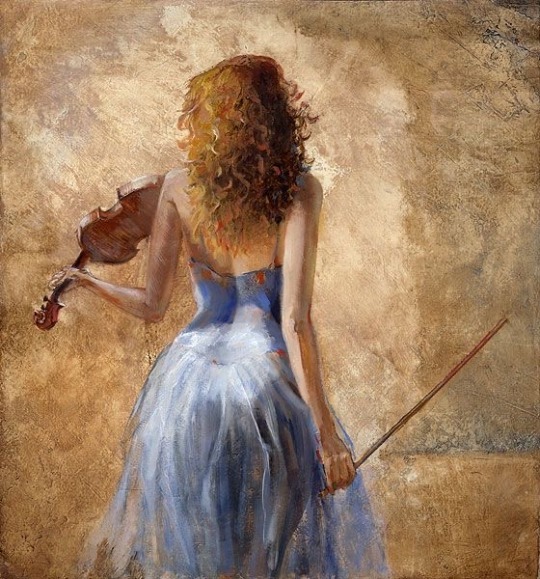

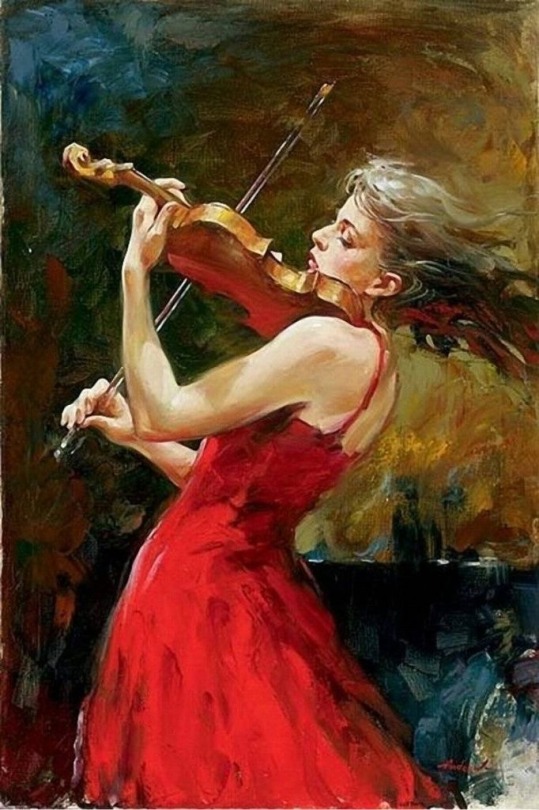

"لا أريد العيش كظلّ عابر مستهلك، بل أريد العيش بصدق، مشمولًا بدفء حقيقيّ، مثل وردة مزهرة، أضرعُ كل يوم في صلواتي لكي أصون عالمي الداخلي، بدلًا من السقوط مكبّلًا في العسل المسموم الذي أرى آلاف الناس من حولي يستهلكونه".
- هرمان هيسّه.
I desire not to lead life as a worn out, fleeting shadow. Nay, rather my wish is to live genuinely, with true warmth and in full bloom. Everyday I beseech in my prayers for the strength to preserve my inner world lest I become supressed, so that the sweet poison that I witness myriads of people consuming does not consume me as well.
- Hermann Karl Hesse.
(Arabic Translation: anonymous/Twitter)
(English Translation: by me)
365 notes
·
View notes
Text


Commisson for my friend with characters from Hermann Karl Hesse's book "Beneath the wheel"
#art#illustration#digital illustration#idk how to tag such staff#like is it even a fanart? i guess so#fanart#book fanart#book fandom#hermann hesse#beneath the wheel#Hans Giebenrath#Hermann Heilner#they are silly
45 notes
·
View notes
Note
Can you tell me about rudolf Hess?
I wasn't sure what to write about, but I'll just give a bit of an overview of Hess which might also be a fairly long post. But anyways, let's get into it:
-Rudolf Walter Richard Hess was born in British occupied Alexandria, Egypt on the 26th of April, 1894. He and his family lived quite comfortably. His grandfather founded an import company 'Hess & Co', which Hess's father took over in 1888. His father hoped that his son Rudolf (who was the eldest of three children) would eventually take over the company, and was sent to a business school in 1911.
-Hess began serving in the army when the First World War broke out, and was injured twice. His most well-known injury was a shot he took to the chest which, fortunately for him, was not life threatening (this is important to remember for later). Hess had went on to train as a pilot, but the war ended before he had the opportunity to see any combat. By the end of the war, Hess held the rank of Lieutenant.
-After the war, he went to the University of Munich to study History and Economics. This is where he met the professor Karl Haushofer, who would become one of two of Hess's father figures (the other being Hitler). Hess admired Haushofer and took a keen interest in his ideas on Geopolitics and 'Lebensraum'. When Hess would eventually end up in Landsberg Prison after the failed Munich Putsch, Hess would introduce Hitler to Haushofer.
-As previously mentioned, Hess took part in the 1923 Beer Hall Putsch. Hess's role in the Putsch is that he took hostages. Upon hearing that things were turning sour he had freed the hostages, and would be picked up by his then girlfriend (and future wife) Ilse Pröhl on her bicycle and they would take refuge at the Haushofers, and would then flee to Austria for a bit until he gave himself up.
-Hess had quite a close relationship with Hitler but, like the overwhelming majority of the inner circle, he would only ever refer to him with the formal 'Sie' rather than the more intimate 'du'. Hess was made Deputy Führer by Hitler, but by no means did Hitler want Hess to be his number 2 in the event of his death. It would eventually be formalised that if such an event should occur, Reichsmarschall Hermann Göring would be second in line, and Hess the third (in the event of Göring's death or incapacitation).
-Back to Hess's relationship with the Haushofers, as I find this very interesting. Hess was fully aware that the wife of Karl Haushofer was half Jewish and their son, Albrecht Haushofer (who would go on to work under the then Ambassador to London and eventual Foreign Minister, Joachim von Ribbentrop), was thus quarter Jewish. Hess would always go out of the way to protect the Haushofers from any trouble on the grounds of their Jewish background and would even go out of his way to issue documents to have them exempt from the Nuremberg Laws.
-Prior to the outbreak of the Second World War, Hess began to decline in influence and was slowly being pushed out of Hitler's inner circle. Hess, quite like Hitler, was no fan of paperwork and he would often leave this task, as well as other tasks, to his deputy Martin Bormann. This allowed Bormann to get closer to the Führer and put him in his favour.
-What Hess is most known for is his flight to Scotland in the spring of 1941, and is also one of the great mysteries of World War II for a few reasons. Prior to his flight, he had made a series of test flights in secret (as Hitler had in fact banned him from flying - he had to use a pseudonym to take part in flying competitions), and his friend Albrecht Haushofer had attempted to send a peace feeler to his friend The Duke of Hamilton, whom they had naively believed had a significant influence on British politics. However, this letter had been intercepted by the British Secret Service before it reached Hamilton, so unsurprisingly this flight came as a shock to Hamilton. He took off from Augsburg and flew solo to Scotland in an attempt to end the war with the United Kingdom.
-Hess had navigated quite well in his flight to Scotland and was not too far off from his desired location. However, he had bailed out of his plane, having ran out of fuel. Hess had never parachuted from a plane before (and actually need to turn his Messerschmitt upside down in order to exit it). He had hit the ground hard and lost consciousness, however he describes the flight as one of his greatest achievements. He was taken in by a farmer and Hess introduced himself (in excellent English) as Captain Alfred Horn and that he had an important message for the Duke of Hamilton. He was later apprehended and was treated as a prisoner of war. Whilst a prisoner in the Tower of London he had spoken to Winston Churchill, but considering the bombings that Germany had launched on the UK, Churchill was in no mood for peace. From this point on until the end of the war, realising he had failed in his mission, Hess attempted suicide twice. The first attempt was jumping over a flight of stairs (which had left him with a broken leg), the second involved him stabbing himself with a butter knife (which was easily stitched up). From then on a close eye had to be kept on Hess.
-So now onto why Hess's flight is such a mystery. The mystery behind it is 1. What were Hess's intentions with this flight? Was it truly to end the war? Or was it (as the Soviets had suggested and were convinced of) to get the UK out of the war so Germany can focus on one front instead of two? 2. Whose idea was it? Was he sent on behalf of Hitler or was the flight entirely his idea? Evidence points to the latter of the second mystery. As Albert Speer recalls (as he was at the Berghof at the time Hitler was made aware of what Hess had done), Hitler reacted with a sort of "animal cry". In addition, Hitler wanted Hess executed for treason, so I'd argue that it's safe to say that the flight to Scotland was all Hess's idea.
-During his imprisonment in the UK, Hess became increasingly paranoid. He would often claim that his food was being poisoned and as a result of this he was suffering from amnesia. This led to him losing a significant amount of weight. Upon his arrival at Nuremberg after the war, Hess had arrived with remains of food he had saved to prove that he was being poisoned. These were confiscated from him. Attempts were made to stimulate his memory at Nuremberg, by brining in people that he knew (including Göring and some staff that worked for him), however Hess persisted and showed no response. Hess was deemed fit to stand trial, and later admitted in court that his amnesia was feigned.
-He was sentenced to life in prison at the Nuremberg Trials, having been found guilty on counts one (conspiracy to commit crimes) and two (crimes against peace) of the indictment. He was declared innocent of the other two charges (war crimes and crimes against humanity). It is argued that his flight to Britain saved him from the hangman's noose. Two other defendants were also given life sentences, Erich Raeder and Walther Funk.
-Hess was transfered to Spandau Prison along with six other prisoners (Raeder, Funk, Speer, von Schirach, Dönitz and von Neurath) and was referred to as Prisoner No. 7. Routine in the prison was strict and the prisoners were in most cases forbidden to talk to each other (there would be relaxations though). Hess was described by the American warden, Eugene Bird, as a "problem child" and "difficult to manage" in his book 'The Loneliest Man in the World'. He would often refuse to do any work in the prison and would claim to be sick to get out of doing work.
-By the 1st of October 1966, Hess was the remaining prisoner of Spandau. Being the only one left, restrictions put on him were relaxed and he was allowed to make his own routine. This would often include walking multiple laps of the prison gardens, reading books (he had accumulated a large collection and was gifted books from Speer and von Schirach prior to their release from the prison), watching movies and television (he was given a small television after a stay at hospital in late 1969) and gardening. He also had a keen interest in the moon landing and other space missions.
-Hess had forbade his family to see him in prison on the grounds that he didn't feel it honourable to do so. Only in 1969 (during the hospital stay, where it seemed as though Hess would actually die) did he finally permit his family to see him. They had not seen him in 28 years. From then on they made regular visits.
-Naturally by this time, calls for his release were getting louder. A petition to have him freed (founded by his son, Wolf Rüdiger) accumulated over 300,000 signatures. All allied powers except for the Soviets were in support of his release, but any attempt to do so was vetoed by the Soviets. They wanted to make sure he died in prison.
-Hess died at the age of 93 on the 17th of August 1987 in the summer house in the prison gardens. He was found to have strangled himself with an extension cord, and the cause of death was ruled a suicide. Spandau Prison was then demolished within the following days to prevent it becoming a shrine for Neo-Nazis. Conspiracy theories surrounding his death still remain today. His son requested a second autopsy, stating that a man of his age (who was also suffering from arthritis) could not have committed suicide in such a manner. Instead he claimed that Hess had been murdered by the British. A very wild conspiracy suggests that the man in Spandau Prison was in fact not Hess at all and was in fact an impersonator, and that Hess had been murdered decades ago. This theory has obviously been disproven, and Richard Evans demolishes such an argument in his book 'The Hitler Conspiracies'.
-In 2011 Hess's grave was exhumed and the remains were cremated on behalf of his family's wishes, his ashes scattered at sea. This was done to deter pilgrimages by Neo-Nazis that had made Hess a martyr.
Well, this concludes my fairly long essay (or shall I say Hessay?). This is merely an overview of his life. Although I could make a separate post on facts about him that really interest me. I really appreciate the ask, and I hope this wasn't too long of a read.
20 notes
·
View notes
Text
society if the girlies were as insane about hermann karl hesse as they were about fyodor mikhailovich dostoevsky
11 notes
·
View notes
Photo
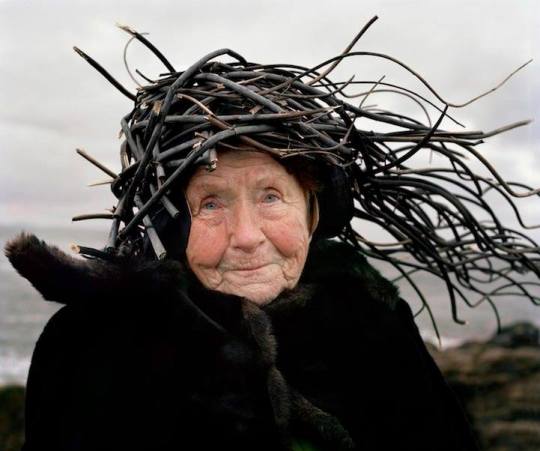
‘’So the tree rustles in the evening, when we stand uneasy before our own childish thoughts: Trees have long thoughts, long-breathing and restful, just as they have longer lives than ours. They are wiser than we are, as long as we do not listen to them. But when we have learned how to listen to trees, then the brevity and the quickness and the childlike hastiness of our thoughts achieve an incomparable joy. Whoever has learned how to listen to trees no longer wants to be a tree. He wants to be nothing except what he is. That is home. That is happiness.” - Hermann Karl Hesse
15 notes
·
View notes
Text
Hier kommt die Liste meiner Lieblingsautoren (werde es von Zeit zu Zeit ergänzen):
📜 🪶 Hermann Hesse
🎖️🕊️ Erich Maria Remarque
🍁🍂 Lucy Maud Montgomery
🚼🤴 Janusch Kortschack
🏚️🌗 Joseph Karl Benedikt von Eichendorff
🔆⏳ Lew Nikolajewitsch Tolstoi
🌚🖤 Fjodor Michailowitsch Dostojewski
🧙♂️🔮 Joanne Rowling
🛡️🏰 John Ronald Reuel Tolkien
3 notes
·
View notes
Text
Así como la locura, en un grado superior, es el principio de toda ciencia, así es la esquizofrenia el principio de todo arte, de toda fantasía
"El lobo estepario", de Hermann Karl Hesse, escritor, poeta, novelista y pintor alemán, nacionalizado suizo
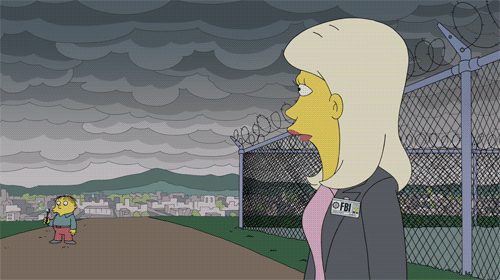
#Hermann Karl Hesse#Hermann Hesse#Libros#El lobo estepario#German people#Swiss people#Frases#Locura#Ciencia#Esquizofrenia#Arte#Fantasía#Los Simpson
11 notes
·
View notes
Text
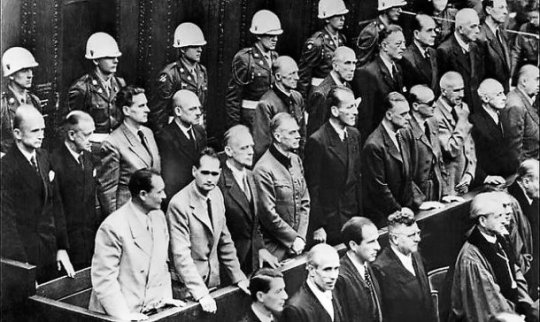
El 1 de Octubre de 1946, finalizaba un hito de la historia universal, aunque aún existen dudas sobre si fue un bastión de jurisprudencia o uno de los atropellos legales mas abominables, ese día terminaban los "juicios de Nüremberg". Consumada la derrota Alemana de la segunda guerra mundial, y ante el estupor universal por las atrocidades cometidas por el régimen nazi, los aliados vencedores coincidieron en que había que generar un shock jurídico para desalentar futuros brotes megalómanos con devastadores consecuencias. Por ello en 20 de Noviembre de 1945 se inició un proceso legal sin precedentes a los responsables alemanes de los aberrantes crímenes de la segunda guerra mundial. De los mas de 4.000 acusados, solo 611 fueron llevados a juicio, entre los mas importantes estaban Hermann Goering, Alfred Jodl, Rudolf Hess, Joachim von Ribbentrop, Wilhelm Keitel, Karl Doenitz, Wilhelm Frick, Erich Raeder, Baldur von Schirach y Fritz Sauckel. Se tipificaron delitos anteriormente inexistentes como "Crimen de guerra", "Crimen contra la humanidad", "Genocidio" y "Guerra de agresión". El tribunal estaba compuesto por Geoffrey Lawrence de Inglaterra, Francis Biddle de los EEUU, Henri Donnedieu de Vabres de Francia y Iona Nikítchenko de la URSS. El 1 de Octubre de 1946 el tribunal encontró culpables a la mayoría de los acusados, de los 24 principales jerarcas nazis cuales 11 fueron condenados a muerte y 3 a cadena perpetua, el resto corrió suerte dispar entre condenas menores y la absolución. A este juicio le siguieron otros 12 procesos mas contra responsables militares de menor rango y a civiles colaboracionistas. Pese a la necesidad de castigar los crímenes mas horrendos de la historia universal, el proceso ni siquiera rozó la legalidad. Los acusados fueron juzgados por sus enemigos militares, responsables de crímenes similares, era inverosímil ver un representante de la URSS juzgando a responsables de crímenes de guerra. Los alemanes no fueron acusados de asesinatos, torturas u otros hechos legalmente tipificados, sino de crímenes definidos como tales con posterioridad a ser cometidos, las pruebas presentadas no necesitaban ser certificadas y no había recusación ni apelación. El propio peso de las atrocidades cometidas hicieron que legalmente nadie objetara las irregularidades del proceso, aunque se lo conoce como "El juicio sin ley" los victimarios de 6 millones de judíos masacrados de manera aberrante merecían un castigo aunque no se guardaran las formas. Adolf Eichmann, Martin Bormann y Josef Mengele fueron juzgados en ausencia, luego se descubrió que Bormann había muerto en la defensa de Berlín. Eichmann en cambio había podido refugiarse en la Argentina, años mas tarde el MOSSAD lo encontró y trasladó a Israel donde fue ejecutado. Por su parte Mengele nunca fue capturado y murió de causas naturales en una playa del Brasil.
Web
11 notes
·
View notes
Text
I went to Standard Ebooks and downloaded a bunch of books I wanna read from a variety of authors, just anything that sounded interesting. Ready to be loaded onto my new kindle once it arrives
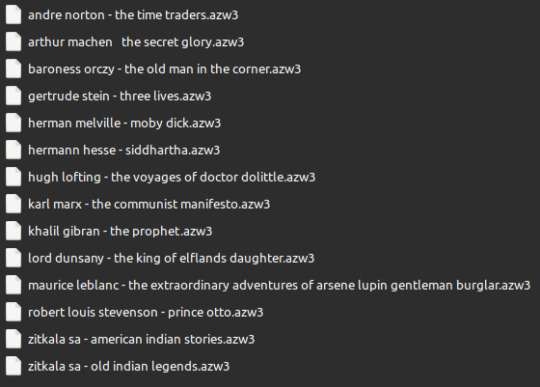
[ID: list of ebook files in azw3 format in a file explorer.
andre norton - the time traders.azw3
arthur machen the secret glory.azw3
baroness orczy - the old man in the corner.azw3
gertrude stein - three lives.azw3
herman melville - moby dick.azw3
hermann hesse - siddhartha.azw3
hugh lofting - the voyages of doctor dolittle.azw3
karl marx- the communist manifesto.azw3
khalil gibran - the prophet.azw3
lord dunsany - the king of elflands daughter.azw3
maurice leblanc - the extraordinary adventures of arsene lupin gentleman burglar.azw3
robert louis stevenson - prince otto.azw3
zitkala sa - american indian stories.azw3
zitkala sa - old indian legends.azw3
END ID]
1 note
·
View note
Text
100 magnificent quotes

100 Magnificent quotes
100 magnificent quotes, great aphorisms, ideas, maxims and quotations by various famous authors selected for the World of English by Carl William Brown, the literary avenger.
Oh, love isn't there to make us happy. I believe it exists to show us how much we can endure.
Hermann Hesse
Madness is something rare in individuals - but in groups, parties, peoples, and ages, it is the rule.
Friedrich Nietzsche
Human behavior flows from three main sources: desire, emotion, and knowledge.
Plato
The mirror is my best friend because when I cry it never laughs.
Charlie Chaplin
Aphorisms are the true form of the Universal Philosophy and containe the greatest quantity of thought in the smallest space.
Friedrich von Schlegel
Educate the children and it won’t be necessary to punish the men.
Pythagoras
If knowledge can create problems, it is not through ignorance that we can solve them.
Isaac Asimov
Without goals, the very concept of intelligence is meaningless.
Steven Pinker
I suppose that in no educational institution can one become an educated person.
Mikhail Bulgakov
No one's fate is of any interest to you except your own.
Mikhail Bulgakov
Respond intelligently even to unintelligent treatment.
Sun Tzu
The reason I talk to myself is because I’m the only one whose answers I accept.
George Carlin
A fool contributes nothing worth hearing and takes offence at everything.
Aristotle
By now humanity has become so imbecile that we often tend to mortify intelligence, in order not to offend stupidity.
Carl William Brown
Show respect to people who don't even deserve it; not as a reflection of their character, but as a reflection of yours.
Dave Willis
Life is nothing but a competition to be the criminal rather than the victim.
Bertrand Russell
It is far better to be silent than merely to increase the number of bad books.
Voltaire
The more real you get, the more unreal the world gets.
John Lennon
The more intelligence you have, the more you will suffer.
Arthur Schopenhauer
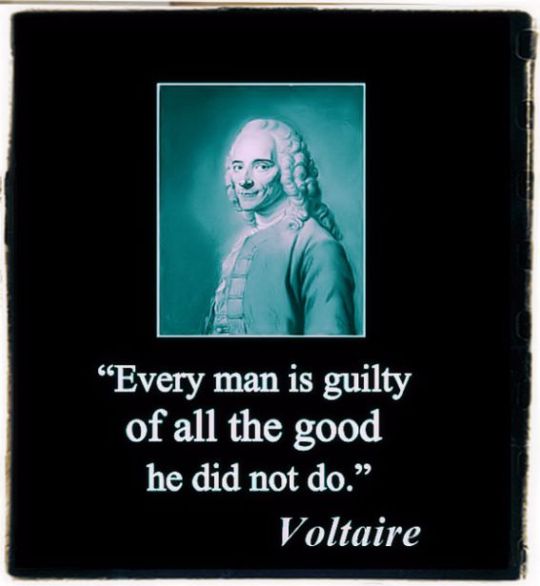
Voltaire quote
Discipline is choosing between what you want now and what you want most.
Abraham Lincoln
The hardest thing to learn in life is which bridge to cross and which to burn.
Bertrand Russell
Love on one side is not enough, love is a dialogue, not a monologue.
Oriana Fallaci
Interacting with people that don't like you it's a fundamental process to study human stupidity.
Carl William Brown
The measure of a man is what he does with power.
Plato
No matter how you feel, get up, dress up, show up, and never give up.
Regina Brett
The secret of change is to focus all of your energy, not on fighting the old, but on building the new.
Socrates
Fashions have done more harm than revolutions.
Victor Hugo
A man who fears suffering is already suffering from what he fears.
Montaigne
From each according to their abilities, to each according to their needs.
Karl Marx
There is nothing in the world so much admired as a man who knows how to bear unhappiness with courage.
Seneca
The saddest aspect of life right now is that science gathers knowledge faster than society gathers wisdom.
Isaac Asimov
A man's manners are a mirror in which he shows his portrait.
Goethe
I was ashamed of myself when I realized life was a costume party and I attended with my real face.
Franz Kafka
Without love living is easy; but it's meaningless.
Leo Tolstoy
Nobody is going to pour truth into your brain. It's something you have to find out for yourself.
Noam Chomsky
Emancipate yourselves from mental slavery, none but ourselves can free our minds!
Bob Marley
Knowledge which is acquired under compulsion obtains no hold on the mind.
Plato
Those who look for the bad in people will surely find it.
Lincoln
It is not the man who has too little, but ht eman who craves more, that is poor.
Seneca

Nietzsche quote
You can’t get much done in life if you only work on days when you feel good.
Jerry West
The more I learn about people, the more I like my dog.
Mark Twain
In our society logics is intertwingled with nonsense, good things with evils ones, and most of the time you can't tell which is which, therefore there is nothing more truly realistic than stupidity.
Carl William Brown
Avoid doing what you would blame others for doing.
Thales
To destroy war, destroy patriotism.
Leo Tolstoy
I don’t trust anyone who’s nice to me, but rude to a waiter because they would treat me the same if I were in that position.
Muhammad Ali
Learn the rules like a pro, so you can break them like an artist.
Pablo Picasso
A gem cannot be polished without friction, nor a man perfected without trials.
Seneca
Nobody realizes that some people expend tremendous energy merely to be normal.
Alber Camus
Non serve a niente essere vivi, se bisogna lavorare.
André Breton
All cruelty spring from weakness.
Seneca
Be careful what you tolerate, you are teaching people how to treat you.
Dr. Phil McGraw
Better to die fighting for freedom then be a prisoner all the days of your life.
Bob Marley
For the Putrid President of Russia, remember Sun Tzu wise words, that is to say, the greatest victory is that which requires no battle.
Carl William Brown
Get busy with life's purpose, toss aside empty hopes, get active in your own rescue.
Marcus Aurelius
All media exist to invest our lives with artificial perceptions and arbitrary values.
Marshall McLuhan
Life is such a great a teacher that when we don't learn a lesson, it will repeat it.
Anonymous
Fishes live in the sea, as men do on land: the great ones eat up the small one.
Pericles
A bad system will beat a good person every time.
W. Edwards Deming
Our life is what our thoughts make it, used to say Marcus Aurelius, but I would add that sometimes it is even worse!
Carl William Brown

Chomsky quote
You have your way. I have my way. As for the right way, the correct way, and the only way, it does not exist.
Friedrich Wilhelm Nietzsche
Simplicity is not a mere idea. To be simple demnds a great deal of intelligence and sensitivity.
Jiddu Krishnamurti
People are not disturbed by things, but by the view they take of them.
Epictetus
Disturbance comes only from within, from our own perceptions.
Marcus Aurelius
All higher humor begins with ceasing to take oneself seriously.
Herman Hesse
The longer I live, the more convinced I am that this planet is being used by other planets as a madhouse of the universe.
George Bernard Shaw
The task of the modern educator is not to cut down jungles but to irrigate deserts.
C.S. Lewis
Education without values, as useful as it is, seems rather to make man a more clever devil.
C.S. Lewis
A wise man can learn more from a foolish question than a fool can learn from a wise answer.
Bruce Lee
We have freedom of thought, now we need thought.
Carl Kraus
I may not have been sure about what really did interest me, but I was absolutely sure about what didn't.
Albert Camus
No one is useless in this world who lightens the burdens of another.
Charles Dickens
Never underestimate the power of stupid people in large group.
Geroge Carlin
The opinion of 10,000 men is of no value if none of them knows anything about the subject.
Marcus Aurelius
Some rise by sin, and some by virtue fall.
William Shakespeare
Never depend on the admiration of others. There is no strength in it. Personal merit cannot be derived from an external source.
Epictetus
The old world is dying, the new world is slow to appear and in this chiaroscuro the monsters arise.
Antonio Gramsci
In most men, intelligence is a field which remains uncultivated for most of life.
Eugène Delacroix
Man is the only creature who refuses to be what he is.
Albert Camus
Character cannot be developed in ease and quiet. Only through experience of trial and suffering can the soul be strengthened, ambition inspired, and success achieved.
Helen Keller

Karl Marx
Wise men speak when they have something to say, fools speak because they have to say something.
Aristotle
What moves those of genius, what inspires their work is not new ideas, but their obsession with the idea that what has already been said is still not enough.
Eugene Delacroix
Character cannot be developed in ease and quiet. Only through experience of trial and suffering can the soul be strengthened, ambition inspired, and success achieved.
Helen Keller
An honest man is always a child.
Socrates
Open your mind before your mouth.
Aristophanes
Neither Christ nor Buddha nor Socrates wrote a book, for to do so is to exchange life for a logical process.
William B. Yeats
Why should we feel anger at the world? As if the world would notice.
Marcus Aurelius
Love is the state in which man sees things most decidedly as they are not.
Friedrich Nietzsche
Only during hard times do people come to understand how difficult it is to be master of their feelings and thoughts.
Anton Chekhov
Most people do not really want freedom, because freedom involves responsibility, and most people are frightened of responsibility.
Sigmund Freud
I no longer know if I wish to drown myself in love, wodka or the sea.
Franz Kafka
The first thing that reading teaches us is how to be alone.
Jonathan Franzen
There is no greatness where simplicity, goodness and truth are absent.
Leo Tolstoy
Unexpressed emotions will never die. They are buried alive and will come forth later in uglier ways.
Sigmund Freud
The love for all living creatures is the most noble attribute of man.
Charles Darwin
Experience is the hardest kind of teacher. It gives you the test first and the lesson afterward.
Oscar Wilde
The most common form of despair is not being who you are.
Soren Kierkegaard
Each of us assumes everyone else knows what he is doing. They all assume we know what we are doing. We don’t.
Philip K Dick
Life's tragedy is that we get old too soon and wise too late.
Benjamin Franklin
Nothing shows a man's character more than what he laughs at.
Goethe

100 magnificent quotes to read
He who knows all the answers has not been asked all the questions.
Confucius
Gentleness is stronger than severity, water is stronger than rock, love is stronger than force.
Herman Hesse
Better to die fighting for freedom then be a prisoner all the days of your life.
Bob Marley
Art is the most intense mode of individualism that the world has known. I am inclined to say that it is the only real mode of individualism that the world has known.
Oscar Wilde
Everyday is like a fashion show and the whole world is the runway. Elegance is when the inside is as beautiful as the outside.
Coco Chanel
There is always some madness in love. But there is also always some reason in madness.
Friedrich Nietzsche
Hating people is like burning down your own house to get rid of a rat.
Harry Emerson Fosdick
If you wish another to keep your secret, first keep it to yourself.
Seneca the Younger
When you have faults, do not fear to abandon them.
Confucius
It takes a minute to have a crush on someone, an hour to like someone, and a day to love someone... but it takes a lifetime to forget someone.
Kahlil Gibran
He who laughs at himself never runs out of things to laugh at.
Epictetus
L'amore è l'arte che non si impara mai e che si sa sempre.
Benito Pérez Galdós
The more we value things outside our control, the less control we have.
Marcus Aurelius
The more I think about it, the more I realize there is nothing more artistic than to love others.
Vincent Van Gogh
The greatest victory is that which requires no battle.
Sun Tzu
Facts or opinions which are to pass through the hands of so many, to be misconceived by folly in one, and ignorance in another, can hardly have much truth left.
Jane Austen
Do not spoil what you have by desiring what you have not; remember that what you now have was once among the things you only hoped for.
Epicurus
People may spend their whole lives climbing the ladder of success only to find, once they reach the top, that the ladder is leaning against the wrong wall.
Thomas Merton
For we are all divorced from life, we are all cripples, every one of us, more or less. We are so divorced from it that we feel at once a sort of loathing for real life, and so cannot bear to be reminded of it.
Fyodor Dostoevsky
Don’t miss these other similar posts:
100 best quotes and aphorisms
100 magnificent quotes and aphorisms
100 brilliant quotes and aphorisms
100 famous quotes and aphorisms
100 memorable quotes and aphorisms
100 top great quotes and aphorisms
100 excellent quotes and aphorisms
100 great quotes and aphorisms on Love
Great and famous philosophy quotes
Quotes by authors
Quotes by arguments
Thoughts and reflections
Read the full article
4 notes
·
View notes
Text
展覽/從山姆.詹克斯(Sam Jinks)的〈犬頭(Doghead)〉淺談人與動物、人性與本性(動物性)及其非人化意涵
山姆.詹克斯(Sam Jinks)2008年創作的〈犬頭(Doghead)〉,是以狐狸結合男人的形象呈現的雕塑作品,狐狸眼睛微歛的模樣像是進入恍惚狀態,輕柔放在左胸的右手,以及柔軟半側躺的姿勢,呈現一種近似祭品般,柔美又脆弱的神態。
這讓我不禁想到埃及眾多以獸首人身形象出現的神明,譬如貓女神芭斯特,又或者與此雕塑外型類似,負責秤陀人心善惡的胡狼神阿努比斯。
從遠古先祖的動物崇拜,我們得以窺見人與動物既是狩獵者與獵物(相互為捕食者與被捕食者),也是信徒與信仰(崇慕動物的力量、特質;或者恐懼動物的報復)間緊密卻又疏離的關係。
然而人和動物的關係並非止於實質上的「人類」和「動物」,同時亦意味著精神意義上的人性與本能(動物)。赫曼.赫塞(Hermann Karl Hesse)的著作《荒野之狼(Der…

View On WordPress
4 notes
·
View notes
Text
Michael Corleone as Ubermensch?
Another one overdue, settling all old scores--
An entire century was a single seed of thought for Nietzsche. Sigmund Freud , Karl Jaspers, Martin Heidegger, Oswald Spengler, Thomas Mann, Hermann Hesse, Rainer Maria Rilke, André Gide, Jean Paul Sartre, Albert Camus, George Bernhard Shaw, WB Yeats, one cursory glance through the streets of 20th century intellect and the influence of Nietzsche is undeniable. Some men indeed are born posthumously.
With all due respect for his gifted ability for original and innate insights, it would be unjust to credit Nietzsche alone for such remarkably widespread influence. For, he had the privilege and the premise to take his aim standing on the shoulders of giants: From Plato to Dostoevsky, he had systematically drawn from and dissected all schools and thoughts before him. What he came up with the confluence of such a comprehension was an abstract and fragmented ideology that would go on to define the direction of the 20th century starting from Freud in the early part to the deconstructive post-modern movement during its later quarter.
Anyone who is acquainted with the works of Nietzsche would know that there is no single defining principle in his thought unlike most of the schools that preceded him. In Nietzsche, one encounters abstract planks which are hard to be understood and thereby are only open to interpretations. Yet they are recognised as a salient signposts in the journey of human thought. One such major plank is that of Ubermensch.
Nietzsche alludes to the Ubermensch in the opening segment of Thus spake zarathustra and only vaguely without much elaboration . This unfortunately has lead to the often misconceived notion that Ubermensch is an ideal man superior to any other average human. A mistake even balanced thinkers like Santayana couldn’t escape. I think an easier, although agreeably a tedious attempt to understand Nietzsche’s Ubermensch is to follow his thought process through his complete works beginning from The birth of Tragedy to Ecce Homo as one single entity. But alas! Even then, just like life, all one gets is to make only an interpretation. I have, since being introduced to Ubermensch tried to peel layer after abstract layer to understand this concept at different times and from different perspectives. I saw that such efforts led me to form a core of a concept often wrapped by other changing satellite-ideas. Naturally the next step was to find the match for the concept amongst famous people known. I found weirder and obscure matches but a popular and a compelling one would come from a fiction. And the more I ponder I about him(character) and his life the more I’m convinced he has come to be the valueless nihilistic icon that Nietzsche had written nearly hundred years back. He is Michael Corleone , conceived by Mario Puzo but imprinted in our memories by the genius of Coppola in the form of the talented Al Pacino. Yes, very few men in the history of humanity for what it is now and what is to be written, would supersede Michael Corleone as an example for Ubermensch.
I initially had thought of writing this post by alternatively comparing Nietzsche’s writings with the character of Michael corleone and sketch out the similarities/differences. But it made me realise that it is too intricate and also perhaps quite demanding on the reader if s/he is not well acquainted with either or both. Hence to avoid the risk of that free floatingness I have decided in favour of just presenting a summary of Michael Corleone’s character. Hopefully this would encourage the readers to find out more on Nietzsche ‘s idea of Ubermensch and make their own judgement.I have restricted only to film and not the charecter in the book on which it was based. Again, such a task being a product of individual taste and perception naturally it precludes any logical consistency and objectivity. Therefore dear reader, proceed with utmost prejudice.
Michael is almost like any man, brought up in a protected culture, loving and loved by his family, starry eyed at the ideals , proud of his nation and privileged to make his conscientious choices. He aspires to lead himself and his wife to be into a civil domestic life. One, that promises respect and comfort that any man seeks. Yet Michael appears like a man who hasn’t made his peace. Underneath all , there is a mild air of chastened sadness around him that is presumably imagined to have come from an underlying conflict. On one hand, as an intelligent being he feels strongly for his values that define him, on the other he understands that the family he loves so much and is a part of is not legitimate and is contrary to the very values he cherishes. In this sense of understanding he departs from any average hero. He is not a Christ, Gandhi or Spartacus who symbolise a moral struggle in a value conflict with the extant inimical premises. On the contrary, Michael, born into a paradox, is in conflict with himself. He starts out as the militant attacking himself under peaceful conditions. His yearning to pull himself away from the family shall always be overcome by the fact that he is born into it. As perhaps you would expect Michael to have done all his growing years- the more he reflects about himself and the family, the more he is wants to pull away. Yet is convinced that a respite eludes him , a sad realisation which perhaps renders him so cold, mean and calculative. Unlike a few other protagonists known, it must be noted that Michael chooses to be dedicated to the family out of his own volition. He is not prodded into it. Or there is no personal identification with the pathos that he chooses to lead. Nothing he does is impetuous or precedent. Doesn’t a man hurt worst when punished for his virtues?
Soon, this split devotion to his family is moulded and given form leading him to make desperate choices and share the repercussions of the sins he isn’t personally responsible for but the ones he fully understands and vows his allegiance to. He lets go of his cherished values just like how Ulysses departed from Nausicaa, blessing it rather than loving it. As he says, it is all business. Nothing personal!! So all of this is done with disturbing ease. Thereby, he ensures the personal suffering ensuing from the change in his value system is smooth and well concealed. From his individual aspirations to his family and love, he renews himself in newer values every time he fails himself. And since each of the value is further apart from his real wish he copes by making himself emotionally inaccessible to others and more harrowingly to himself. His anger is the smoke arising off the cold ice. He never grieves in spite of one bereavement after another befalling upon him. As a being, he erases himself. One can only speculate what were his own thoughts about deserting his girl friend and marrying another woman elsewhere, losing her and then after return resuming the old relationship blithely. And in this whole process of alienation that is coupled with personal expectation to fulfil his responsibilities, he departs further away. And away.[1] From everything. Slowly he loses personal desire, value, identity. He will because he ought to. His life is slowly ushered into decadence.
But it must be noted this is only in principle but not in phenomenon. He successfully manages to evade any affective identification towards him and also he is totally in control of his acts and hence is prepared to be accountable for the consequences.
An illustration would help- in the last scene, when Kay questions Michael if he really killed Carlo (Brother in law)? He lividly raises his voice warning her not to question him about his business. This scene evokes two type of principal responses from the audience-- 1.To worship Michael as a symbol of power(and dominance) 2. To sympathise with Kay. But, mostly it is forgotten that he was the same young man dressed in an Marines? uniform who had sat and conversed softly with her at the marriage in the first scene.
Far more importantly, no one would hate him or feel for him. Although it is known that he himself who has consciously willed his destiny (or decadence) he successfully evades hatred and sympathy. That is the elegance of the whole mechanism. Within Michael, a man dies and other is born every time. With this being sustained as a means of preserving himself , his worth as a value(self) ceases and a process begins[1].
If the first part was alienation and initiation of the process, second would be the inevitable direction it had to take. Of power, will and its callousness. He has now learnt very well that the greatest juncture of life is when we gain courage to rebaptise our badness as the best in us. There is no such thing as a moral phenomenon. There is only desire and will. And the rest lies in the great ocean of contempt to be concealed in the heart. In this duties that he has reached out for himself, we see that his fears are validated again - that even a slightest carelessness on his part would mean doom to his successful efforts so far. Similar to the making of Plato’s philosopher king, he battles against everything in the world. Against unidentified enemies, against the state, against his wife (who seems be growing distant), disloyal friends, family, and most notably against himself.
This is symbolised in what I regard as one of the greatest scenes ever captured for the motion picture[2]. I think it runs for about a full minute and a half or two at the beginning of the second DVD. Michael in the heart of the senate enquiry with a failed attempt on his life behind him returns in a car to his Brooklyn mansion. It is winter in New York and one can notice the sullen skies and the overnight snow trodden all around. His car is let in and a solemn looking Michael dressed in a dark suit, a long overcoat and a bowler hat carrying a briefcase gets down and walks slowly towards the door dragging himself in heavy steps. He pauses to look at a small toy car of his child. He comes into the house moving about the study and the dining room, glancing intently at the belongings before he rests his suitcase and takes off the hat. Finally he stands before one of the rooms and finds Kay absorbed in tailoring. The background music is aptly kept minimal. Not a single word is uttered.
It is the pain and the possibilities that adds depth to the character of this scene. Bound to his family, he realises the ultimate of all the truths that in spite of everything, he is alone and doomed to be prepossessed in fundamental doubts. The ones he cant share with others or make peace within himself. At this juncture, he supersedes his desires as responsibility/duty into an abstract attribute, beyond good and evil that takes control and care of him passively into the future. It all comes naturally now, with no emotion or thought underneath. There is no family now, it is him and a world that wants to be without him. And the consequences.
Not everyone, I just want to wipe off my enemies, that is all. Even if the enemy is supposedly his own brother he is pushed aside, mercilessly. A demonstration of exercise of will naked without any form of draped morality. Or even pretension of. He survives. His family survives. But in his efforts to survive he has created a world of its own new values, successful and productive to many lives but built on personal losses, including his own -- his children and family as his wife separates from him. Now,expectedly, The apollonian is slowly parted with to make way of growing Dionysian.
The criminally underrated third part is completion of the harmony[3] . With age and failing health Michael has grown soft. The powers are distributed and fragmented throughout in return for much sought legitamacy. He is shown to be socially humorous, something he wasn’t before( I was listening to Tony Bennett songs). It is all about reminiscing and a Dionysian accounting himself for the past within. He understands his acts- the inevitability and responsibility of it all. (remember the Pope’s words it is only just for him to suffer) But still he is neck deep in the consequences of his own making. He continues in another conflict to complete the promise he made to his father and also unable to restrain his own need for security and power. As he remorses (not repent) for his deeds, he tries to-- cut off his children from his business , mend his relationship with his wife and for the last time he takes one final half hearted plunge at more power -all small steps to pave way for his descent as he himself understands very well.(The more I want to get out, the more they pull me in) And consequently, he ends up paying a heavy ransom for his life, the one he never owned in a full sense anytime. He fails to protect his daughter and his son does not share the lineage of his dreams.
Understandably, for Michael life has come full circle. It is here one might start identifying with his futility and take him for a version of a tragic hero.I think casting him into the mould of tragic hero would be imposing a self presumptous role on his life, a life that has not been open to us in the first place.Although his life has been tragic in a sense there are huge issues that separates him from a conventional tragic hero.
One could easily as well imagine Michael to be taking his son to a baseball game on a Saturday noon or retiring as a senator too dignified to use a walking stick in public. But then, knowing Michael, he would have known well at the bottom that he had more to offer and effect world better. And still, the irony of it all is that if given the choice he still would have been compelled himself to choose the life he did.
Again and again. Eternally. because that is what makes his pain, glory, legacy, himself.
The concluding shot is a deserving tribute-a frail, dust-beaten image of the old Michael Corleone stooped in a chair, open to the sun, slowly falls unto the earth lifeless; him a moral idealist, son, brother, lover, father, and above all Don corleone, breathes his last - lonely and alone, resigned and trodden like a common man. He has lost his father, brothers, wives, friends, mother , daughter and the grand empire he constructed, in fact everything that he ever valued. He has no more to offer, accept, refuse or bargain. His entire life has amounted to neither individual glory nor personal love that could be cherished. He is not a successful hero , not even a failed martyr. Yet he has changed the world around him irrevocably as such and given every possible chance he would continue to do the same. And In that-- he has transcended himself, history, and humanity thus transforming himself into an idea, into an abstraction , into Ubermensch.
At the end, despite everything , what he represents beside a caution is hope and power of will and a constant attempt to be better eternally against everything, however futile that such a venture is in itself, that being the nature and the inclination of us all as humans , in different shades of desires and varying resources at disposal he becomes the essence and embodiment of humanity.
That is the tragedy and the beauty of it all.
Where you see ideal things, I see what is --
human, alas, all-too-human. I know man better.
~Friedrich Nietzsche, Ecce Homo
[1] It is this process that Coppola has beautifully captured on the film. Notice the lack of subtitles in the restaurant shooting scene for Italian but when Michael is in Italy subtitles are used while he speaks to Apollonia’s father . It is this smooth flow in transformation in values that Nietzsche alluded to so abstractly.
[2]That scene is unbearably haunting. The first time I watched it I was too occupied with the story and missed it under my nose, but the second time around I was almost choked. Every drop of ink spilled from Freud , Mann, Sartre, to Camus, et al has been so gracefully captured in one cinematic moment. Beside its conceptual bearings it not only shows how coppola has understood the character of Michael but also is a stamp on Al Pacino’s talent. In my view only two actors could have pulled it off as convincingly Al Pacino did- Herr Humphrey Bogart and that cute Cossack named Sean Penn. The latter perhaps would have needed a tighter director. The scene also is an excellent reference for film techniques, for e.g. lighting and sound , music. Et al. Pure mad genius.
Trivia -Coppola suffers from Bipolar affective disorder which my friend considers as a role of living a playful god and pained human in one life.
[3] Although not widely agreed, I’ve never felt the series would have been complete without part 3. The scenes in the third part are in a unique way mirrored with the first-The function, hospital scene, the conversations(with Kay, Mancini, his son Anthony with his own in part1 ) the assassinations. Etc.
PS- Having not said all and with the length of the post, I am not quite happy but the Glasgow London train doesn’t run indefinitely.
#random#personal#philosophy#books#literature#cinema#cinematography#michael corleone#al pacino#the godfather#francis ford coppola#mario puzo#nietzsche#anti hero
1 note
·
View note
Text
Pilgrim Kamanita - A Legendary Romance - by Karl Gjellerup
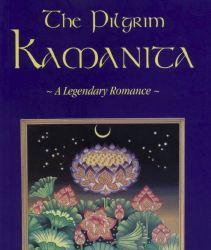

Pilgrim Kamanita – A Legendary Romance
Pilgrim Kamanita - A Legendary Romance. In 1917, the two Danish authors Karl Gjellerup and Henrik Pontoppidan shared the Nobel Prize in Literature. Karl Gjellerup is the least known but wrote some fantastic works on diverse subjects. He wrote in German and here is a surprising work of literature he wrote on Buddhism. It is about the journey of Kamanita, an Indian merchant's son, from earthly prosperity and sensual romance, till his meeting with a stranger monk who is Gautama Buddha. In Thailand, The Pilgrim Kamanita is on the school programme. The Pilgrim Kāmanīta’ was published in German in 1906, 16 years before Hermann Hesse published his similar and much more well-known novel Siddartha. This version of The Pilgrim Kamanita is published and edited by Amaro Bhikkhu as a dedication when the Amaravati Buddhist Monastery opened in 1999.
Download the work here (28,3 MB/540 pages):

Pilgrim Kamanita by Karl Gjellerup
You can buy the print version here: Link
Pilgrim Kamanita – A Legendary Romance: An Overview
"Pilgrim Kamanita – A Legendary Romance" is a captivating novel by Nobel Prize-winning Danish author Karl Gjellerup. Set against the backdrop of ancient India, this tale is a profound exploration of love, karma, rebirth, and the teachings of Buddhism.
The Enchanting Encounter
The narrative unfolds with Kamanita, the son of a prosperous merchant, encountering the mesmerizing Vasitthi during a festive celebration—their instant connection and deep-seated love for each other form the crux of the story. However, fate has other plans, and the two lovers are separated by circumstances beyond their control.
Trials, Tribulations, and Teachings
As the story progresses, both Kamanita and Vasitthi navigate a series of challenges. Their journeys are not just physical but also spiritual, as they grapple with the consequences of their past actions, or karma. The teachings of the Buddha play a pivotal role in the narrative, offering insights into the nature of existence, the cycle of rebirth, and the path to enlightenment.
Kamanita's Spiritual Odyssey
A significant portion of the novel is dedicated to Kamanita's spiritual evolution. Following his demise, his virtuous deeds earn him a place in one of the heavenly realms. Yet, even in paradise, he remains tormented by the absence of Vasitthi. His relentless quest for her and his encounters in the celestial realm provide readers with a deep understanding of Buddhist concepts of life, death, and the afterlife.
Conclusion
"Pilgrim Kamanita – A Legendary Romance" is more than just a love story. It's a philosophical exploration of life's deeper meanings, intertwined with the teachings of Buddhism. Gjellerup's masterful storytelling and profound insights into human nature make this novel a must-read for those seeking both romance and spiritual enlightenment.
Read the full article
0 notes